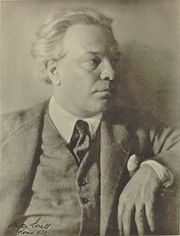| La campana sommersa | |
|---|---|
| Opera by Ottorino Respighi | |
 Respighi in 1934 | |
| Librettist | Claudio Guastalla |
| Language | Italian |
| Based on | Die versunkene Glocke by Hauptmann |
| Premiere | 27 November 1927 Stadttheater Hamburg |
La campana sommersa (The Sunken Bell) is an opera in four acts by Italian composer Ottorino Respighi. Its libretto is by Claudio Guastalla, based on the play Die versunkene Glocke by German author Gerhart Hauptmann. The opera's premiere was on 18 November 1927 in Hamburg, Germany. Respighi's regular publisher, Ricordi, was displeased by his choice of subject, and refused to publish the opera. This led to its being published by the German publisher Bote & Bock, and a German premiere.
The fairy-tale world of Hauptmann's play inspired Respighi to create his most lavishly and imaginatively orchestrated operatic score, which frequently reminds the listener of his famous symphonic poems. Since the opera's anti-hero Enrico is a bell maker, Respighi fills the music with many chiming and ringing effects.
Roles
| Role | Voice type | Premiere cast, 18 November 1927[1] Conductor: Werner Wolff |
|---|---|---|
| Rautendelein, an elf girl | soprano | Gertrud Callam |
| Ondino, a water spirit | baritone | Josef Degler |
| A faun | tenor | Paul Schwartz |
| Enrico, a bell maker | tenor | Gunnar Graarud |
| An old witch, Rautendelein's grandmother | soprano | Sabine Kalter |
| A priest | bass | Rudolf Bockelmann |
| A schoolmaster | baritone | Herbert Taubert |
| A barber | baritone | Karl Wasehmann |
| Magda, Enrico's wife | soprano | Emmy Land[n 1] |
| The spectres of Enrico's two children | speaking roles |
- ^ Emmy Land was the wife of Werner Wolff, the conductor
Instrumentation
La campana sommersa is scored for the following instruments:[2]
3 flutes (3 doubling on piccolo), 2 oboes, English horn, 2 clarinets, bass clarinet, 2 bassoons, 4 horns, 3 trumpets, 2 tenor trombones, bass trombone, bass tuba, timpani, bass drum, handbells, cymbals, tam-tam, triangle, Basque drum, xylophone, anvils and drum sticks, harp, celesta, organ, bell, strings.
Synopsis
Act 1
The bell maker Enrico has built a bell for a new church, but the Faun has thrown it to the bottom of a lake. Enrico is in despair and Rautendelein feels compassion for him. Rautendelein decides to go in the human world, and Ondino tries in vain to dissuade her.
Act 2
Enrico is overwhelmed by the misfortune, and his wife Magda despairs that he can start working again. But Rautendelein, in the form of a little girl believed dumb that the priest has introduced in the family to help Magda, manages to magically bring back strength and vigor in him.
Act 3
Love was born between Rautendelein and Enrico. Enrico has abandoned Magda and even intends to found a new religion, for which he is designing a temple. In vain the priest tries to dissuade him: "It is easier that the bell submerged at the bottom of the lake rings", replies Enrico. But later Enrico learns that Magda, desperate, has killed herself by jumping into the lake. While his children announce the accident, from the water the tolling of the bell is heard. Enrico, horrified, abandons Rautendelein.
Act 4
Desperate, Rautendelein has sunk into a spring and now is the wife of Ondino. Enrico is now close to the end of his life: a witch grants his wish to view again Rautendelein, who appears to him "as white as the Angel of Death". At first, she pretends not to recognize him, then answers to his pleas, kisses him and gently lays him, dying, out.
Recordings
| Year | Cast (Rautendelein, Magda, Enrico, Fauno) | Conductor, opera house and orchestra | Label |
|---|---|---|---|
| 1956 | Margherita Carosio, Rina Malatrasi, Umberto Borsò, Tommaso Frascati | Franco Capuana, Orchestra e Coro della RAI di Milano | CD: Great Opera Performances[3] |
| 2003 | Laura Aikin, Alessandra Rezza, John Daszak, Kevin Connors | Friedemann Layer, Opéra et Orchestre National de Montpellier Languedoc-Roussillon | CD: Accord Cat: 4761884[4] |
References
- ^ Casaglia, Gherardo (2005). "La campana sommersa, 18 November 1927". L'Almanacco di Gherardo Casaglia (in Italian).
- ^ "La campana sommersa, P 152 – work details". l'Orchestra Virtuale del Flaminio (in Italian). Retrieved 9 August 2020.
- ^ "Ottorino Respighi – La campana sommersa – Franco Capuana (1956)". operaclass. Retrieved 7 January 2015.
- ^ Barker, Anthony. "Respighi The Sunken Bell ACCORD 2 CD 476 1884". MusicWeb International. Retrieved 7 January 2015.
External links
- "Italian libretto" (PDF). Fondo Ghisi, Faculty of Musicology, University of Pavia. Retrieved 7 January 2015.